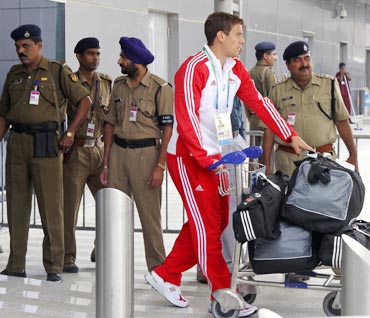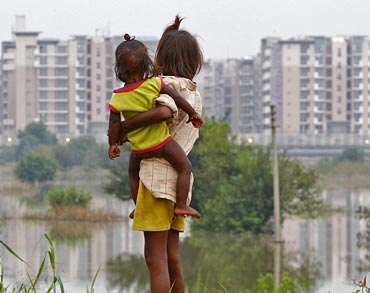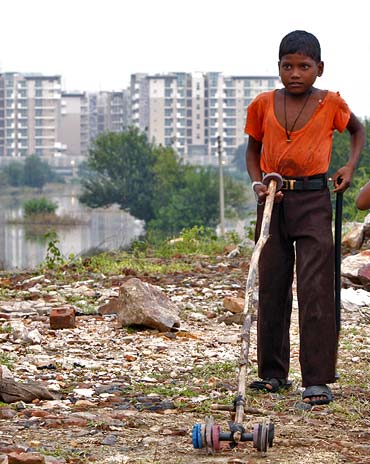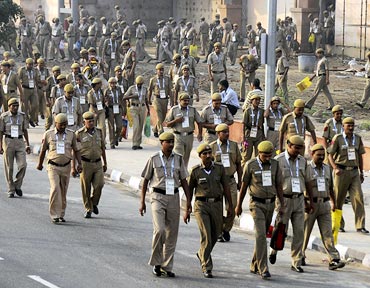Commonwealth Games Federation chief Mike Fennell inspected the Games Village on Friday and said "considerable improvements" have been made there even as embattled the organisers continued their sprint against time to complete preparations for the October 3-14 event.
"It is good to be in Delhi, and the briefing I received from my CEO, Mike Hooper, last night, was that considerable improvements have been made within the Village, with further significant resources deployed by Delhi Chief Minister, Mrs Dikshit, to make good what was a concerning situation," Fennell said in a statement.
Fennell, accompanied by Organising Committee chairman Suresh Kalmadi, Secretary General Randhir Singh CGF CEO Mike Hooper, took stock of the arrangements at the athletes Village, which was dubbed "filthy and uninhabitable" by visiting international delegates a couple of days ago.
- Coverage: Commonwealth Games 2010
Photographs: Reuters
Athletes arrive at Commonwealth Games
Image: A member from England's team walks past Indian security personnel at the Delhi airportThe first batch of athletes arrived in India for the Commonwealth Games on Friday, opting to stay at a hotel instead of unfinished, filthy accommodation as the future of the showcase event still hung in the balance.
Twenty-two members of the English men's hockey team arrived at New Delhi's new $2 billion international airport, ushered in by dozens of armed police.
They will stay at a hotel until at least Saturday before moving to the athletes village which, along with a bridge collapse and a suspected militant attack on two foreign visitors, have thrown the Games into crisis and proved a setback for India's efforts to showcase its modernity to the world.
'Our international image has taken a beating '
Image: Workers prepare their brooms before entering the Games villageEnvironment Minister Jairam Ramesh complained about the organisation of the Games, echoing a chorus of international criticism that has seen many top sports stars boycott the Games due to shoddy construction, filth and fears of militant attacks.
"I think our international image has taken a beating and I hope we come out of it very quickly," Ramesh told Headlines Today in New York on Friday.
"We could have done without the embarrassment of this Commonwealth Games. It's embarrassing for our global image."
Delhi Games estimated to have cost $6 billion
Image: A girl carrying a child stands outside her makeshift tent in front of the Games villageThe Games, held every four years for mostly former British colonies, are estimated to have cost $6 billion. Asia's third largest economy, was awarded them in 2003 but did not begin proper preparations until two years ago.
The Delhi Games may turn out to be the most compromised since a 1986 boycott of the Games in Britain, when 32 nations stayed away because of then Prime Minister Margaret Thatcher's government's position over apartheid South Africa.
The Australian and New Zealand prime ministers said they understood if their athletes decided not to take part.
But England said it would send 551 athletes to the Games because there were signs of improvement on the ground.
Kenya said it would send a 240-strong team after receiving security assurances from India, officials said, though several of its top athletes have withdrawn because of illness or fatigue.
Wales also gave its team the all-clear to go.
Children employed at Games construction sites
Image: A child plays with a toy in front of the Games villageCyclist Greg Henderson became the first New Zealand athlete to withdraw over concerns about health and security. A dengue fever epidemic has hit Delhi and two foreign visitors were shot and wounded by suspected militants in the city on Sunday.
Olympic cycling champion Geraint Thomas and three other Welsh riders also opted out of the Games.
India had hoped to use the Games to display its growing global economic and political influence, rivalling China.
Instead, they have become a major embarrassment for the government, which is trying to fend off criticism.
Reuters reporters have also seen children working at Games construction sites, despite it being illegal to employ minors.
Critics say the chaotic planning and execution of the Games highlight India's challenge of bringing many public sector infrastructure projects up to international standards.
'Delhi Games security tightest ever'
Image: Indian police arrive at the Games VillageNew Zealand chef de mission Dave Currie, who made security his No 1 priority ahead of the October 3 start, said New Zealand's security appraisal hadn't been neglected, especially in the wake of last week's shooting in Delhi where two tourists were injured.
"It [security] is probably the thing that we have the most comfort in really at this moment of time. Certainly around the village and the systems we have seen there they are extraordinarily tight," Currie said from Delhi.
"We are in and out of the village a lot. The perimeter fence is strong and secure and there is a lot of police presence," he was quoted as saying by Stuff.co.nz.
Currie, a veteran administrator at Commonwealth Games and Olympics, described the personal inspection process as "the tightest I have seen anywhere".
"There are layers upon layers, upon layers. You put your bags through scanners, you are then electronically patted down and then physically patted down. It's pretty impressive really and the same levels are working at the games venues," he said.








Comment
article